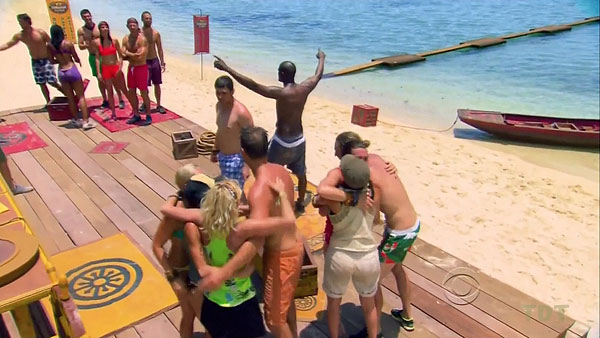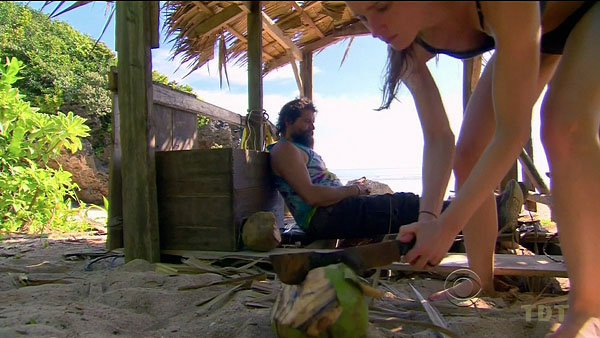

Overall, this was a satisfying, compelling episode of Survivor, the primary strengths of which were storytelling and character development. For the first time in a while, editing made a decent attempt to introduce and examine every contestant, particularly the new ones, and some of the new contestants made great first impressions (mostly Vytas and Caleb, with Brad along for comic relief). Expanding the concept of Survivor to a game played with/against a loved one creates new dramatic possibilities, as was demonstrated repeatedly, and at least for one season, the concept seems legitimately worth exploring.
Even so, however, the future is not necessarily entirely bright. We also loved the first episode of South Pacific, which, as it also featured Redemption Island, seems like a fair comparison. Going forward, each episode will now be saddled with the Redemption Island format: an elimination duel at the outset, followed by a reward/immunity challenge, then a Tribal Council that the opening act has already established isn't all that important. Not only that, but future episodes will last the standard 60 minutes, instead of the premiere's 90, and a good chunk of that real estate will be squandered on RI. Still, there's no foreseeable letup in the watching the contestants wrestle with the competing priorities of tribe vs. loved one, so we'll at least keep watching and hoping... for now.
Logic vs. emotion
We'll admit it, our initial reaction to the central Blood vs. Water twist was "10 more returning players?! And they're playing against family members?! WTF? Nepotism! Creative bankruptcy!" After thinking about it for a while, though, we could see that having from-the-get-go pairs altered the strategic game a bit (think of all the pairs at the Philippines merge). Just as this concept had started to grow on us, however, Redemption Island was announced, along with 40+ other twists, so we threw up our hands in dismay. But so far, that avalanche of alterations has worked.
Early returns for the basic loved ones vs. returnees format are overwhelmingly positive. It has forced a refiguring of basic Survivor strategies. At its most fundamental level, it's brought emotion into a game that had largely eschewed it in favor of dispassionate, calculating strategy, at least among the players who win. And not only has emotion made a surprise return appearance, it's now often in direct conflict with strategic thinking.
While we're sure CBS and Jeff Probst love the neverending cascade of tears most of all, we appreciate how much more intrinsically complicated and fraught with peril each core part of Survivor has become, from forming alliances to winning challenges to picking someone to vote off. Almost everyone (at the moment) is playing for two people, and the convergence and/or conflict between the player's own alliances and those of their loved one add a layer of complexity to the strategic calculations. Each additional variable factors in even more difficulty: the prospect of a booted player returning from Redemption Island, the possibility of a tribemate (or alliancemate) swapping out for a booted loved one at Redemption Island, and so on. The drama is a big part of what was good about the first episode, sure. But the universe of brand-new gameplay possibilities seems massive.
You take the good, you take bad: The facts of Redemption Island's half-life

As we mentioned before, though, this season also harbors a lurking, hulking beast that could still vaporize the goodwill the premiere engendered: Redemption Island. But it's not the old RI (mostly). A number of twists have been piled on top of Redemption Island this season, in a clear attempt to redeem (sorry) the concept. All in all, we think it's the least-objectionable version of RI yet, but it's still a net drag on the show. How did the individual twists pan out? Here's how we see them:
Loved one substitution:
We initially dismissed this as a trap for the exceptionally game-unaware, since it seemed highly unlikely anyone would intentionally blow up their game to go to RI, where they have a 33% chance of being out of the game in the next episode, possibly after losing at some crappy, luck-based carnival game. But now that Rupert actually did it, and John was forced to make an obviously wrenching decision not to, we can see why it's there. It's unclear if Rupert really did Laura a favor, because after she went from a tribe that didn't want her to a situation where she could potentially win her way into people's respect, he then forced her onto a tribe that's mad at him for leaving, which is also one where she's also outnumbered 8-1 by returnees. (Luckily for Laura, there were multiple Galangs who performed worse than she did in the first challenge.)
Making the Morning 1 vote-off palatable:

As cruel as the Palau Day 3 pick-'em was, voting people out of the game without their even having the opportunity to talk to their new tribemates was even worse. Having Redemption Island to catch the rejects at least takes some of the sadism away, since people who got to RI via a snap Morning 1 vote seem slightly more likely to avoid being voted out immediately after returning than someone who was voted out after attracting the ire of their tribe's dominant alliance. This was far better than the relentlessly pointless "Night Zero" farce, anyway.
Three-person, double-survival duels:
We haven't seen it yet, but they're coming. We get that the idea was to increase and extend the duel's dramatic possibilities, with someone like John being forced to decide, week after week, if he still wants to let poor Candice languish at RI. Also, there will be three fretting loved ones in the audience, at least for the first duel. Even with the cumulative positive aspects listed, though, the simple truth is: it's possible that someone could finish second in every pre-merge duel save the last, and re-enter the game (or worse yet, do so after the merge). That's not surviving. Although it would be sort of hilarious if Candice and Rupert finished 1-2 in every duel until the merge, forcing them to endure each other's presence for circa 20 more days.
Duel winners get to hand out a hidden idol clue:
Again, not shown yet, but this seems the silliest twist of all. Who cares? There's potential for modest strategy, we suppose, in either sucking up to the dominant power in the tribe you left, faking a secret alliance with someone to torpedo their game, or giving the finger to everyone by rewarding your actual ally/loved one. But idols have been so easy to find recently that the idea of clues being necessary means we're not holding our breath.
In the end, it's still Redemption Island:
Ozzy returned to the game at final five, and came within a few puzzle pieces of winning two ICs, and fishing and lounging his way to the million-dollar prize in South Pacific. What if, for example, Rupert opts out on Day 1 here, comes back at the merge, gets voted out again, comes back again at final five, and wins the last two immunity challenges? With no blood on his hands, and a single, heroic gesture at the start, a jury could give him the million, despite the fact that he had no alliance the entire game, participated in only three challenges, and essentially took a six-week vacation in a pre-made beach hut. Whom did he outwit or outplay? How did he have any impact on the way the regular immunity/Tribal Council game transpired? And that's the problem with Redemption Island.
 Jeff Pitman is the founder of the True Dork Times, and probably should find better things to write about than Survivor. So far he hasn't, though. He's also responsible for the Survivometer, calendar, boxscores, and contestant pages, so if you want to complain about those, do so in the comments, or on Bluesky: @truedorktimes
Jeff Pitman is the founder of the True Dork Times, and probably should find better things to write about than Survivor. So far he hasn't, though. He's also responsible for the Survivometer, calendar, boxscores, and contestant pages, so if you want to complain about those, do so in the comments, or on Bluesky: @truedorktimes
- BvsW recaps index
- Pre-season discussion
- Ep.1: Logic vs. emotion
- Ep.2: Less than the sum of its parts
- Ep.3: F*** you, Brad Culpepper!
- Ep.4: Thank you, Brad Culpepper!
- Ep.5: Too many Lauras
- Ep.6: Monica and the bandit
- Ep.7: Midway mayday?
- Ep.8: Showdown, bro down
- Ep.9: Filler
- Ep.10: Loud family
- Ep.11: Sketchy
- Ep.12: Whiteout
- Ep.13: No redemption value
- Ep.14: Fun-loving